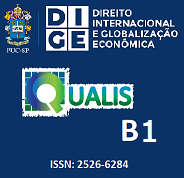THE NEW CODE OF CIVIL PROCEDURE AND TRANSPORT LAW
Palavras-chave:
Adhesive contractual clauses – Adhesion contracts – Unilateral imposition of cargo carriers, Lack of voluntariness of the adhering party, Insurer legally subrogated is not part of the original contractual party.Resumo
This paper presents important elements of the Transport Law and Insurance with respect to the Code of Civil Procedure in force since March 18, 2016 and the new procedural dynamics, especially with regard to litigation involving international maritime and air transport contracts of cargos. The main objective is to defend the non-application of rules in subscription contracts that deal with the preference of the foreign jurisdiction chosen by contracting parties and the arbitration agreement. International transport contracts of cargos by maritime and air as usual accession makes the provisions become abusive because they are rendered unnecessarily. There is no real foreign jurisdiction chosen by contracting parties without voluntariness much less arbitration agreement but there is impositions of carriers on cargo consignees, inhibiting the full prevalence of procedural rules in relation to the foreign jurisdiction chosen by contracting parties and arbitration agreement. The situation is even more serious when insurer is legally subrogated to the claim of the insured and cargo consignee is part of the contract of sea or air transport. The abusive characteristic of such contract clause, unilaterally available in printed and pre-ordered contractual instruments becomes even more evident when it seeks the projection of legal effects on those who have not even participated in the business itself. The foreign jurisdiction chosen by contracting parties assumes inhibition of constitutional guarantee of access to justice and also promotes the undue depletion of the sovereignty of national jurisdiction. In the case of arbitration, there is no voluntariness at all. There is a prevalence of "sine quae non" application, a substantial insurmountable formal defect, that is, noncompliance with the provisions of the Brazilian arbitration law itself. The contractual instruments of international cargo transport do not follow the expressed rules of Brazilian "lex specialis", but its exclusive free will antagonistic to the Brazilian legal system as a whole. The work is not to upset the new procedural rules, but against the possible application of one and / or another in disputes involving the matters of Transport Law related to the adhesion contracts especially when one of the parties are related to Procedural law when insurer is legally subrogated to the original claim of the consignee.Downloads
Publicado
2018-12-10
Como Citar
Cremoneze, P. H. (2018). THE NEW CODE OF CIVIL PROCEDURE AND TRANSPORT LAW. Revista De Direito Internacional E Globalização Econômica, 4(04), 152–173. Recuperado de https://revistas.pucsp.br/index.php/DIGE/article/view/40616
Edição
Seção
Editorial




